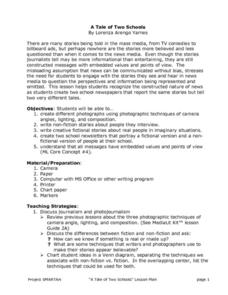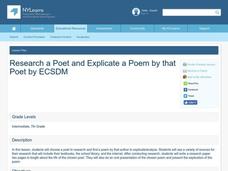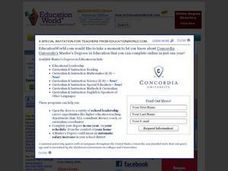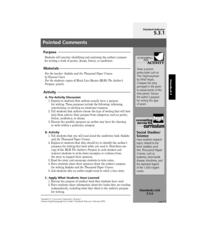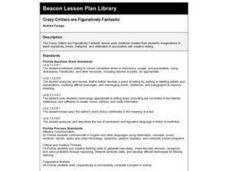Curated OER
Weather Proverbs
Define and write proverbs! Learners define proverbs, use the Internet to find weather-related proverbs, and talk with their parents to learn other proverbs. There's a well-structured worksheet included here.
Curated OER
Who Invented English Anyway?
In these English lesson plans, young scholars use video, the Internet and non-fiction essays to research the history of the English language. They write a short research paper and design a PowerPoint presentation showcasing their findings.
Curated OER
Comprehension Skills: Evaluate Using Fiction Stories and Aesop's Fables
Primary readers investigate several comprehension skills in the ten lessons of this unit. Forming opinions about stories, comparing stories to each other, using Venn Diagrams, and applying the ideas from a story to real life situations...
Curated OER
A Tale of Two Schools
Learners create different photographs using photographic techniques of camera angles, lighting, and composition. They write non-fiction stories about people they interview and create two school newsletters that portray a fictional...
Curated OER
Analyzing the Use of Irony in a Short Story
Ninth graders examine how literature connects to real-life and see how irony aids in the development of theme. They read Shirley Jackson's The Lottery, and discuss elements of foreshadowing and situational irony. Then learners will write...
Curated OER
Research a Poet and Explicate a Poem by that Poet
Using your school's media center, internet research, and a SMART board, 7th graders research a chosen poet and write a research report. Additionally, 7th graders explicate one poem by the poet within their report. Several resource links...
Scholastic
Pilgrim and Wampanoag Daily Life
A lesson looks at the Pilgrims and Wampanoag tribe during the first Thanksgiving. Scholars compare and contrast information presented by an online activity then discuss their findings. Learners examine the two group's daily routines and...
Curated OER
It's Magic: Understanding the Roles, Responsibilities, and Requirements of Workers
Fifth graders investigate the world of work in relation to knowledge of self and to make informed career decisions. Then they break into groups to complete the training and education for two careers selected from a listing in the...
Curated OER
Create a Public Opinion Survey: The Middle East in the News
Though the discrete content here is a pair of New York Times articles about a 1998 military strike on Iraq and the coincident impeachment by the House of Representatives of then-President Clinton, this detailed plan for creating,...
Curated OER
My Community Book
Young learners examine different places in their neighborhood using informational texts. First they identify a place that they like to play and predict if it will be in the nonfiction book Community at Play.They will share their favorite...
Curated OER
"Spelldown" by Becky Mushko
Learners read Spelldown, by Becky Mushko and consider how it portrays the Appalachian community. They define and discuss vocabulary presented in the story and write a comparison/contrast paper analyzing two of the story's characters. The...
Curated OER
Note Taking By Crayon
Skim a brief biography of Amelia Earhart with your class, and then assign groups of researchers one of four topics listed: Amelia's family life, important airplane flights during Amelia's life, turning points in Amelia's life, and...
Curated OER
Self-Monitoring Strategies and Vocabulary Games
Middle and high schoolers identify how to discover a word's meaning by exploring context clues and any pictures, diagrams, photographs, and charts that might be included. They continue this process with other examples and locate one on...
Curated OER
Introduce Vocabulary: Owen and Mzee: The True Story of a Remarkable Friendship (Hatkoff & Kahumbu)
The heartfelt true story of Owen the hippopotamus and Mzee the 133-year-old tortoise will have budding readers engaged as they practice vocabulary in the context of Isabella Hatkoff's nonfiction story. Although you could include more,...
Curated OER
Ready-Set-Go-Whoa!
The Apaches: People of the Southwest offers readers a chance to employ the “Ready-Set-Go-Whoa!” strategy (an adaptation of the KWL) to test what they know and summarize what they learn as they read Jennifer Fleischner’s nonfiction...
Curated OER
Historical Agency in History Book Sets (HBS)
Study historical events by combining the study of historical fiction and non-fiction. Learners read about true past events in historical fiction novels and then research non-fiction accounts of the same events. What are some differences...
Curated OER
History: Fact of Fiction?
Students find a historial novel online and distinguish between fiction and nonfiction books. They research three historical events related to their novel and write a letter to a figure from their novel's time period.
Curated OER
Lesson Plan on Social Studies Research
Fourth graders listen to nonfiction stories, read fact sheets about historical characters and events, and record facts in groups. They write a paper based on six facts from their research.
Curated OER
Let's Sum It Up
Students summarize a selected piece of nonfiction text as a group. After reviewing the instructors preferred method for summarizing information by identifying the main idea and supporting details, groups write a summary paragraph of a...
Curated OER
The Time I Got Lost
Third graders go through the writing process but substitute paper and pencil with the computer to create a story about "The Time I Got Lost".
Curated OER
Pointed Comments
Fifth graders analyze pieces of writing to identify the author's purpose of writing. In this writing lesson plan, 5th graders consider a variety of pieces of writing such as, poetry, drama, fiction, and non-fiction. Each student...
Curated OER
Finding Your Story: Helping Students Begin Their Memoir
Young scholars write their memoir. In this memoir lesson, students study the differences between an autobiography and a memoir. Young scholars construct an outline as the basis for their memoir.
Curated OER
Making Predictions by Analyzing Key Ideas and Details
Students make predictions. In this language arts activity, students read nonfiction texts and make predictions about what they are going to read. Students confirm and revise their predictions as they read the text.
Curated OER
Crazy Critters are Figuratively Fantastic
Eighth graders use creatures created from their imaginations to practice hyperbole, simile, metaphor, and alliteration in association with creative writing. They utilize a worksheet imbedded in this plan to guide their writing.
Other popular searches
- Nonfiction Writing Technique
- Writing Nonfiction
- Nonfiction Writing Rubrics
- Narrative Nonfiction Writing
- Leads in Nonfiction Writing
- Creative Nonfiction Writing
- Editing Nonfiction Writing
- Writing Frames Nonfiction
- Writing Summary of Nonfiction
- Nonfiction Writing Lessons
- Writing Nonfiction Summary
- Types on Nonfiction Writing



